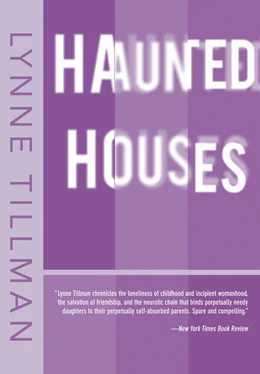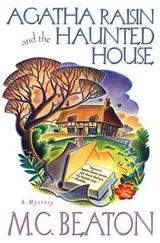Innocent kissing ended in the seventh grade and Jane and Michael broke up. They had reached the age when kisses and hugs were no longer sufficient. Sex filtered through the classroom and gym in a form as regimented as grade school education. Jane drew back. She didn’t want to be like other girls. She wanted to be respected. Respect and sex were as far from one another as she was from being an adult, a state she wanted to reach quickly, so that she would know things and be free, and not care about what people thought.
When she reached her adolescence, having grown into it with breasts Jane thought of as bumps, her sisters’ male friends took notice of her. It was the summer she turned thirteen and one sister bought her stockings and Arpège perfume. Jane lived in white shorts and a red boat neck. Her sisters’ friends came out on weekends. One young man, an Austrian, looked at her in a way that made her uncomfortable. Considering himself a genius, as well as a good judge of women, he told her sister that Jane was a regular Lolita. Jane was reading a novel called The Violated , whose central character, Sheila, was a girl her age. Sheila was directing Hamlet ; it was in the middle of the book. Sheila announced to the neighborhood kids who were the cast, Everyone talks dirty to Ophelia.
Her father said Jimmy was dirty. He didn’t brush his teeth much, even when he dropped by to see Jane. Sometimes their meetings were accidental, but Jane didn’t really believe in accidents. If questioned she would deride notions of fate — she was very rational — but still she thought Jimmy and she were meant for each other. Now that he was a senior, he drove his convertible into the city, and spent time with people Jane didn’t know. Though one high school yearbook picture shows her sitting in his convertible, it was unusual to find her there.
Of the people Jane knew when she was fourteen, it was Lois who seemed like her only real friend. Lois wanted to go to Hollywood, to be an actress. She wore falsies that stuck out from her narrow chest like small ice-cream cones. I don’t care who puts his hand where, she laughed raucously. The two walked around town singing and cracking jokes. They danced in front of clothes stores and beauty parlors. To Jane, Lois was revolutionary because she just wanted to have a good time. It was raining as they walked along Main Street. Jane told Lois that the first time she ever took a shower she made her father go in with her because she was afraid of the water. So she told Lois, who was laughing, I insisted we use an umbrella and we stood there, my father and me, under that open umbrella. Your father doesn’t sound that bad, Lois said, thinking that Jane might have exaggerated about his temper. You’ll see, Jane answered.
Her sisters were hardly ever home, and Jane had her parents to herself. She couldn’t decide if her father was much crazier than he used to be, or whether, now that she was alone, she noticed it more. It didn’t help that business was starting to fall off. His younger brother Larry, who was also his business partner, never seemed to worry. He was divorced, ran around with women, played the horses, and saw a psychiatrist. To Jane, Uncle Larry had style, but he wasn’t a favorite of her mother’s. Years later someone told Jane that her mother was always too much in love with her father. Jane had never considered that what her mother was in was love.
With some determination Jane asked Lois home. Like everyone else Lois found Jane’s father handsome and charming. All the women loved dancing with him, the men thought he dyed his hair. Jane told Lois, in the bathroom where her two older sisters had once gotten ready for dates, that when she was five she used to hide from him here because the door had a lock. They were practicing smoking, They put on go-go pink lipstick and black mascara and left the bathroom. Jane’s father was in the hall, Jane knew the look. His face contorted as he yelled, his hand touching his belt. It was about her makeup. He pushed Jane out of the house, told her that she shouldn’t come back, and slammed the door. Lois and Jane walked along in silence for a while, then Jane said, I’m used to it.
When summer came Lois got a job as an acting counselor in a camp, and Jane’s father insisted she work for him in his office near Times Square. Every morning they caught the 7:52 with the men and their sons. Boys who had been seniors when she was a freshman sat in suits and ties, beefier and older, holding The New York Times in front of their no-longer-boyish faces. Jane got the print all over her hands and never mastered the technique of folding the paper so that she didn’t stick her arm in her father’s face. They got out at Penn Station and walked to work, where she had nothing to do. Her father invented work for her. She typed letters with samples and sent them to businesses chosen from the telephone book. She was as friendly as a dog to any customer who walked in. She watched her father. Uncle Larry rarely came into the office but when he did, her father cheered up. Larry was always optimistic and then off to the racetrack. He loved the horses.
It was a hot summer, and on a particularly hot morning her father suggested she go to a movie on Forty-second Street. It was about 10 A.M.and Jane asked the woman in the box office if it was all right to go in. The woman said, You just pay your money and you go in, which Jane could figure out for herself, having paid her money and gone in to many movie houses. She took a seat near the aisle and the attendant looked up her dress, bending down, being very obvious. She moved to a middle seat and a young man in a light tan cap sat down next to her. The place was empty. She moved; he moved. She couldn’t go back to work so soon. She moved again, he moved again. He placed his hand on her knee and Jane looked at it. It lay there for a while. Jane wondered if he thought he was Holden Caulfield, with that cap on. She kept looking at his hand. It was dark and she could have done anything and no one would have seen or known. She felt something, and it wasn’t exactly that she felt sorry for him. His hand moved a little and feeling that she didn’t care what happened she got up and walked out. Jane wandered around Times Square, settling on playing Fascination till enough time had passed and she could return to her father. Two Doris Day reruns, she heard herself telling him. You know, they’re always the same.
Lois said she wanted to go to UCLA to study acting, and then try to get roles as a comedian or a character actress. I’m not that pretty, she stated indifferently, I couldn’t be the romantic type, but somebody has to be Rosalind Russell. Jane didn’t know what she wanted to do. None of Lois’s friends were as determined as she was. One of them called Jane on a Sunday morning and told her to sit down. It was very early. Jane said what’s wrong and the friend said Lois is dead. She was killed in a car crash.
A funeral for a sixteen-year-old is awful. Lois’s friends weren’t allowed to go to the cemetery. All of them stood together in one part of the chapel, far from the family, so as not to remind them of their loss. Jane’s parents respected her silence and didn’t fight with each other that day. Jane saw Lois everywhere, when she took a bath, when she turned off the lights. There was a glow that she decided was Lois. Without knowing it she mourned her death for nearly eight months until spring came and a boy from another school made her laugh about death. She felt she was betraying Lois in one way, and in another way she knew Lois would understand. There was something horribly funny about death. For Lois’s sake Jane pledged to change her life, to become different so that her death wouldn’t seem so stupid. Jane had always wanted to live her life differently.
Читать дальше












